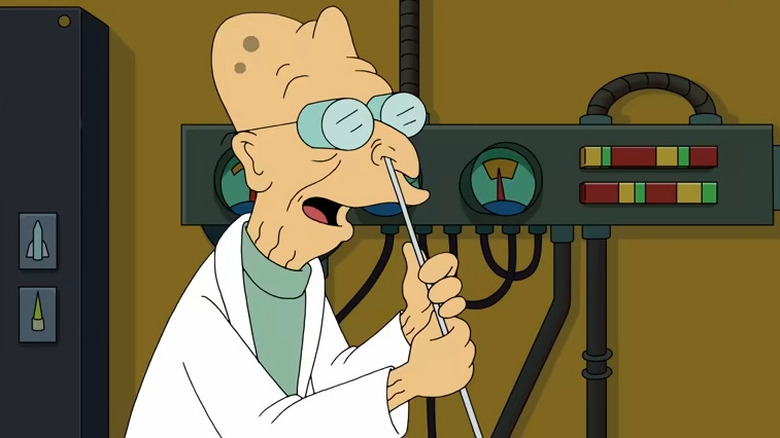Futurama Season 11 Finds The Show Once Again Pitting Science Against Faith
The newest episode of "Futurama," called "Rage Against the Vaccine," is 25 minutes of every COVID-19 anxiety all rolled into a condensed ball. "Rage" opens with a celebration hosted by the head of Bill Nye (himself), finally declaring that COVID-19 has been defeated. Note that "Futurama" takes place in the year 3023. "It's felt like a thousand years," Nye says. "It was actually a little longer," Bender (John DiMaggio) corrects him. Given some recent reports about new variants and new spikes in COVID-19, that prediction feels dismayingly accurate.
But now that COVID-19 has been defeated, there's a new pandemic at play: Explovid-23. This is a virus that causes coughing and sneezing, but also an attack of inexplicable rage and a desire to punch others in the face. This, also, feels dismayingly accurate. The characters all test for the disease by swabbing their noses with enormous Q-tips (seriously, were the Q-tips really that bad? Satirical comedies that play up the physical discomfort of COVID testing are still a little baffling), and it's revealed that Leela (Katey Sagal) has contracted it. She has to quarantine and work moves online, thanks to a video conference program called Gloom.
Naturally, just like here in the 21st century, rumors begin to fly in the world of "Futurama." Is the vaccine safe? Why are people reluctant to take it? It seems that the reluctance is tied to widespread disinformation proliferating on social media, as well as the efforts of one Dr. Banjo (David Herman), a talking orangutan who spends his life debunking scientific theories and pushing unhealthy skepticism. The last time we saw Dr. Banjo, he debated the Professor (Billy West) as to the truth of evolution, pushing religion in its place. The professor famously declared he didn't want to live on this planet anymore.
Explovid-23
The writers' room of "Futurama," its fans know, is loaded with PhDs. Show co-creator David X. Cohen once bragged that his show has 50 years of Harvard education in one room. They are all mathematicians and physicists and have a great deal of knowledge about science and the history thereof. It's clear that they invented Dr. Banjo as an analog for right-wing would-be intellectuals like Glenn Beck who stage their ignorance as merely another form of intelligence. The Professor, the writers' avatar, speaks openly about his scientific discoveries, and Dr. Banjo steps forward to calmly explain that measurable facts aren't really facts and that all scientific ideas can be debunked through specious reasoning.
In "Rage Against the Vaccine," the Professor does indeed invent a vaccine, but the public is suspicious and refuses to get it. The Professor's rival, Dr. Wernstrom (Herman again), also has a vaccine on the market, and they bicker over whose is better. "Futurama" parodies some of the more widely spread vaccine conspiracies. The magnetized skin produced by Wernstrom's vaccine is a feature, not a bug. The Professor calms the crowd by assuring them the tracking chips hidden in his vaccine are totally safe.
The solution to Explovid-23, it seems, rests with Hermes (Phil LaMarr), who feels that there might be a religious solution to the disease. Hermes goes to New Orleans and investigates voodoo magic hoping there's a cure. The rage virus, he feels, might be a low-level form of zombie infection. After a trek down the bayou with a robot skeleton (!), Hermes finds a voodoo shack run by an old romantic rival, Barbados Slim (DiMaggio). In the back is where all the voodoo magic lies. Well, it's where there's a fully functional virology lab.
That's using voodoo!
Science vs. voodoo
The conclusion of the episode marries a little bit of voodoo with a fistful of science. It's revealed that Explovid-23 is about its victims falling under a spell and producing "anti-jujus." The solution involves getting a vaccine ... punctured through a voodoo doll. In the world of "Futurama," this is what marrying science and faith looks like. A little bit of magic, and a lot of rigorous scientific study. In a rare moment of egalitarian consideration, the show lets both things be true. "Magic, to the right eyes," Hermes says, "looks a lot like science."
This is not the first time "Futurama" has made up fantastical science that looks suspiciously like magic. In the 2013 episode "Calculon 2.0," the Professor sought to resurrect the dead robot actor Calculon (Maurice LaMarche, who also voices fan-favorite Zapp Brannigan) using only science and engineering. The robot required a magnetic field generator and laser radiation ... that takes the form of a pentagram surrounded by burning candles. The Professor creates a new motherboard which he carves out of a robot goat he stabs on an altar. The radiation-proof smocks look like cultists' robes. In certain circumstances, science looks exactly like a Satanic ritual. The end of the scene shows the Professor, bearing a tattoo of three sixes on his forehead, declaring, "Hail, science!"
"Futurama" loves to toy with blasphemy, of course, probably because it's so easy and amusing to blaspheme. In an early episode, the Professor makes what might be the most blasphemous joke in the entire series by noting that a few centuries ago, Jesus returned, but it seems the world didn't change much. The Second Coming happened, and life ground on as usual. Cohen and co-creator Matt Groening love these sorts of jokes, and let the train keep rolling with "Rage Against the Vaccine."
New episodes of Futurama premiere every Monday on Hulu.


